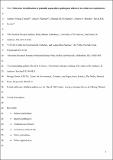Molecular identification of potential aquaculture pathogens adherent to cnidarian zooplankton
Abstract
Cnidarian jellyfish are pest species of marine aquaculture, with their acute impacts well documented in farmed fish, particularly affecting the delicate gill tissue. Less is known about subsequent consequences of exposure, including their association with secondary bacterial infections. The aim of this study was to identify whether potentially pathogenic bacteria were present as part of the adherent microbial populations of three medusozoan jellyfish species; Obelia geniculata, Neoturris pileata and the Lion's Mane jellyfish Cyanea capillata. A number of potential pathogens of commercial aquaculture were identified, including Aeromonas salmonicida, Vibrio splendidus and Vibrio alginolyticus. These findings suggest that jellyfish must be considered not just agents of direct trauma to fish in aquaculture, but also potential reservoirs and vectors of bacterial disease. Since jellyfish may be increasing in the coastal waters where marine aquaculture occurs, the role of jellyfish in bacterial outbreaks has implications for marine aquaculture globally.
Citation
Clinton , M , Kintner , A H , Delannoy , C , Brierley , A S & Ferrier , D E K 2020 , ' Molecular identification of potential aquaculture pathogens adherent to cnidarian zooplankton ' , Aquaculture , vol. 518 , 734801 . https://doi.org/10.1016/j.aquaculture.2019.734801
Publication
Aquaculture
Status
Peer reviewed
ISSN
0044-8486Type
Journal article
Description
Funding: Marine Alliance for Science and Technology Small Grant scheme, the University of St Andrews Russell Trust Award, and Marine Harvest Ltd. MC was funded by a BBSRC EASTBIO studentship and AK was funded by a MASTS Prize studentship.Collections
Items in the St Andrews Research Repository are protected by copyright, with all rights reserved, unless otherwise indicated.

